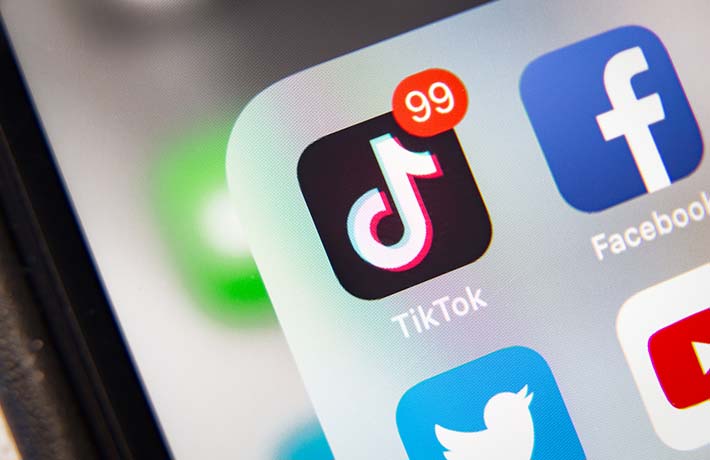01-25-2022 |
Viral TikTok or Copyright Infringement Lawsuit?
By: Jordan Meggison-Decker

Since 2016, TikTok has grown to be a popular platform for viral content creation. TikTok allows short-form video posts and encourages users to engage with the videos. The software then attempts to personalize each user’s experience by showing them videos like those they have enjoyed in the past. Part of what makes each short-form video interesting is the sounds or music the user pairs with the video. When a style of video becomes popular, it is not uncommon for the video’s format to be copied and posted by other users. Popular songs or sounds may be used in one user’s video and then copied by other users recreating the originally posted video. However, a lot of the content posted and consumed on TikTok is subject to copyright protection. As such, it is natural to question whether posts on TikTok are fair to copyright owners.
Copyrightable Material on TikTok
Before diving into all the aspects of a TikTok video that may be copyrightable, it is important to understand what copyright protection is and why it is relevant to TikTok users. Copyright law protects works of authorship. Specifically, copyrights can protect original works of authorship that are fixed in a tangible medium. Some examples of works that can be protected with a copyright include books, plays, sculptural works, paintings, sound recordings, choreography, movies, music, computer programs, and architectural works. Further, as soon as an original work is fixed in a tangible medium, the author of the work owns a copyright to the work. No registration is required for copyright protection to arise. However, in order to sue another person for copying a work, the copyright must be recorded with the United States Copyright Office. Almost all of the components that make up a short-form video posted on TikTok are protected by copyright. For example, the music, sounds, dances, and choreography utilized in a video are subject to copyright protection.
The success of a user’s TikTok video is linked to the content and sound choices that the user makes. To achieve success, a user has the choice of creating their own novel content and sounds or recreating another user’s video idea using the same content and sounds. Users often speculate that if a certain sound or content type has seen success on the platform, a replication of the post should also see success. This speculation has proven true. In fact, it is common on the platform to replicate videos posted by others. As such, sounds and content may be repeated in separate videos posted by different users thousands if not millions of times on the platform. However, reusing the same sounds and content over and over may be unfair to the original user.
TikTok and Copyright Infringement
Copyright law grants an array of rights to owners including the ability to limit unauthorized activities. One way that a copyright owner can protect their original copyrightable material is by claiming that someone who copied their work has committed copyright infringement. There are two ways to prove copyright infringement; (1) by proving an actor directly infringed the rights of the copyright holder; and (2) by proving an actor indirectly infringed the rights of the copyright holder by encouraging or assisting a third party in infringing. Each type of infringement is possible on the TikTok platform.
Direct infringement may be committed when a TikTok user enjoys a copyright holder’s content enough to create their own video using some of the same aspects as the original user. This could include using the same choreography, music, or text as the user in the original post. However, TikTok has anticipated these issues. To mitigate copyright infringement committed by users on their platform, TikTok has included specific language in their user agreement. TikTok states that it does not allow posting, sharing, or sending of any content that violates or infringes another’s copyrights. Further, the platform states that the use of copyrighted content without authorization or a legally valid reason may lead to a violation of TikTok’s policies. However, TikTok’s terms of service also state that while the user creating the content is the owner of the copyright on the content, by submitting the content to TikTok, the user grants TikTok a broad license to use the content as well as to distribute and authorize other users and third parties to use the content. Therefore, when users create posts that use the content of an original user, the original user retains the copyright in the content, but cannot sue another user for using the content. This strategy allows TikTok to protect its users from direct copyright infringement claims.
A party may be liable for indirect copyright infringement when it contributes to, induces, or profits from the infringing acts of others. As such, TikTok itself could be held liable when users copy-protected works using the company’s online platform. However, TikTok has taken steps to protect itself. Although many of the sounds and songs used on TikTok are subject to copyright protection, TikTok has gotten permission to use them. TikTok has entered into licensing agreements with Universal Music Publishing Group, Sony Music, and Warner Music Group which allow the songs created by artists associated with those companies to be used on TikTok without the worry of infringement. Through these broad licensing agreements, TikTok has been able to minimize its personal liability for its platform structure.
Although TikTok has successfully avoided many claims of copyright infringement using agreements and licenses, there are still some instances of infringement that may slip through the cracks. As such, TikTok is not completely shielded and neither are their users. Therefore, it is important to be cognizant of any intellectual property protections associated with a potential social media post and address them before posting the material to avoid any possible repercussions.
Conclusion
The rise of TikTok has led to many interesting developments regarding copyright protection in the digital age. Although becoming a user on a popular platform may seem harmless, it is always important to remember the legal implications of actions taken on the platform. However, by considering what material is subject to copyright protection, obtaining permission to use protected material, and contacting an attorney about implicated legal rights, many issues can be prevented. If you have any questions regarding your intellectual property rights, please reach out to our Intellectual Property team at BrownWinick. We are here to offer trusted legal advice and add value to any matter, including those with complex and novel issues.
